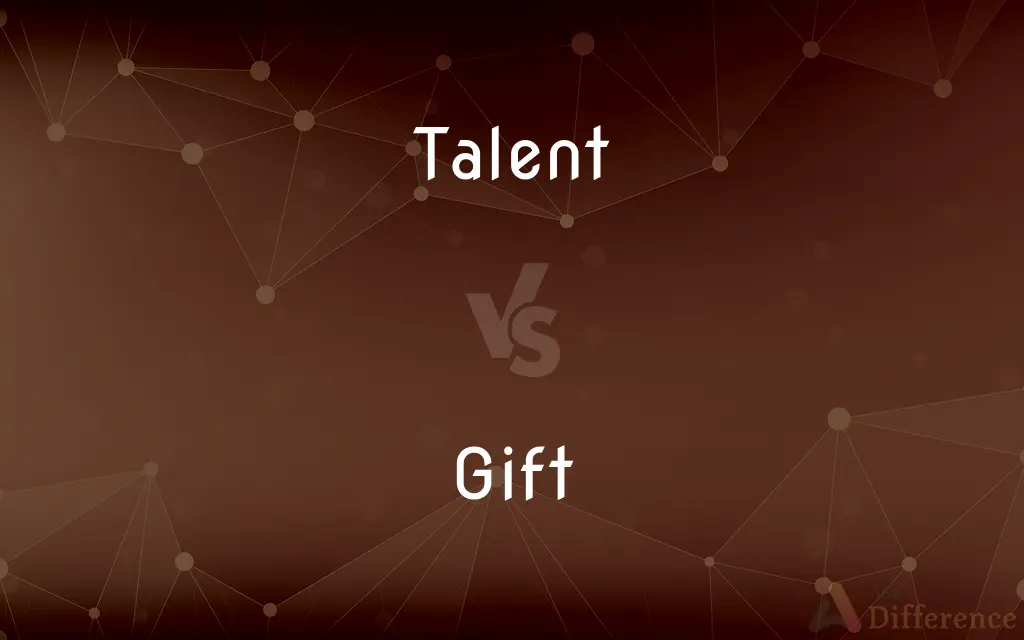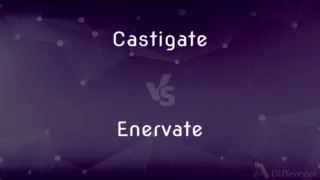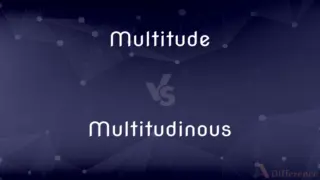Talent vs. Gift — What's the Difference?
By Tayyaba Rehman & Maham Liaqat — Updated on March 7, 2024
Talent refers to a natural aptitude or skill, while a gift is a natural ability or inclination, often perceived as innate and less developed than talent.

Difference Between Talent and Gift
Table of Contents
ADVERTISEMENT
Key Differences
Talent often implies a natural aptitude or skill in a specific area, which can be honed and developed over time through practice and dedication. On the other hand, a gift is generally considered to be a more innate, inherent ability or inclination that one possesses without much effort or development.
While talent often requires nurturing, education, and practice to fully develop and manifest, gifts are typically seen as more immediate and require less external effort to be recognized. However, both can benefit from refinement and cultivation.
Talents are frequently associated with specific skills such as musical ability, athleticism, or artistic prowess, which can be measured and improved upon. Whereas gifts might encompass broader, more intangible qualities like empathy, intuition, or leadership, which are less quantifiable.
In the context of personal growth and achievement, talents are often viewed as areas where structured improvement and achievement are possible. In contrast, gifts are seen as more intrinsic qualities that can enhance personal and professional relationships but might not be the focus of traditional achievement metrics.
The recognition and valuation of talents often occur within structured environments like schools, workplaces, and competitions, where specific criteria are used to assess and improve these abilities. Gifts, however, may be acknowledged and appreciated in more varied and personal contexts, reflecting their less tangible nature.
ADVERTISEMENT
Comparison Chart
Nature
Acquired natural aptitude
Innate ability or inclination
Development
Requires nurturing and practice
Less effort for recognition
Examples
Musical ability, athleticism
Empathy, intuition
Measurement
Quantifiable and improvable
Less quantifiable
Recognition
Structured environments (schools, etc.)
Varied, personal contexts
Compare with Definitions
Talent
Associated with specific abilities.
Her talent in painting won her several awards.
Gift
Innate ability.
He has a gift for making people feel at ease.
Talent
Natural aptitude.
She displayed a remarkable talent for music at an early age.
Gift
Less effort for recognition.
Her gift for languages was evident without formal training.
Talent
Skill that can be developed.
His talent for cooking improved with practice.
Gift
Acknowledged in personal contexts.
His gift for leadership was recognized in community projects.
Talent
Requires nurturing.
His talent for mathematics was nurtured by dedicated teachers.
Gift
Broad, intangible qualities.
His gift of empathy makes him an excellent counselor.
Talent
Recognized in structured settings.
Her athletic talents were recognized during school sports events.
Gift
Enhances personal relationships.
Her gift for storytelling captivates all who listen.
Talent
Natural aptitude or skill
He possesses more talent than any other player
She displayed a talent for garden design
Gift
A gift or a present is an item given to someone without the expectation of payment or anything in return. An item is not a gift if that item is already owned by the one to whom it is given.
Talent
A former weight and unit of currency, used especially by the ancient Romans and Greeks
A mighty steed bought from a Thessalian merchant for thirteen talents
Gift
Something that is bestowed voluntarily and without compensation
I received several gifts for my birthday. Your gift of $100 is greatly appreciated.
Talent
A marked innate ability, as for artistic accomplishment
Has a rare talent for music.
Gift
The act of giving
The painting came into their possession by gift.
Talent
Natural endowment or ability of a superior quality
The play has a cast of immense talent.
Gift
A talent, endowment, aptitude, or inclination
She has a gift for playing the piano.
Talent
A person or group of people having such ability
The company makes good use of its talent.
Gift
To present something as a gift to
Gifted his niece with a watch.
Talent
A variable unit of weight and money used in ancient Greece, Rome, and the Middle East.
Gift
To give as a gift
"King Charles II ... had gifted the land of Carolina to certain members of his court" (Marilyn Yalom).
Talent
A marked natural ability or skill.
He has a real talent for drawing.
Gift
To endow with
Nature has gifted her with a fine voice.
Talent
(historical) A unit of weight and money used in ancient times in Greece, the Roman Empire, and the Middle East, equal to about 30 to 60 kg in various times and places.
Gift
Something given to another voluntarily, without charge.
Talent
(obsolete) A desire or inclination for something.
Gift
A talent or natural ability.
She had a gift for playing the flute.
Talent
People of talent, viewed collectively; a talented person.
The director searched their talent pool to fill the new opening.
Gift
Something gained incidentally, without effort.
Talent
(slang) The men or (especially) women of a place or area, judged by their attractiveness.
Not much talent in this bar tonight—let's hit the clubs.
Gift
The act, right, or power of giving or bestowing.
The office is in the gift of the President.
Talent
Among the ancient Greeks, a weight and a denomination of money equal to 60 minæ or 6,000 drachmæ. The Attic talent, as a weight, was about 57 lbs. avoirdupois; as a denomination of silver money, its value was £243 15s. sterling, or about $1,180.
Rowing vessel whose burden does not exceed five hundred talents.
Gift
(transitive) To give as a gift or donation.
Talent
Among the Hebrews, a weight and denomination of money. For silver it was equivalent to 3,000 shekels, and in weight was equal to about 93 lbs. avoirdupois; as a denomination of silver, it has been variously estimated at from £340 to £396 sterling, or about $1,645 to $1,916. For gold it was equal to 10,000 gold shekels.
Gift
(transitive) To give away, to concede easily.
Talent
Inclination; will; disposition; desire.
They rather counseled you to your talent than to your profit.
Gift
Anything given; anything voluntarily transferred by one person to another without compensation; a present; an offering.
Shall I receive by gift, what of my own, . . .I can command ?
Talent
Intellectual ability, natural or acquired; mental endowment or capacity; skill in accomplishing; a special gift, particularly in business, art, or the like; faculty; a use of the word probably originating in the Scripture parable of the talents (Matt. xxv. 14-30).
He is chiefly to be considered in his three different talents, as a critic, a satirist, and a writer of odes.
His talents, his accomplishments, his graceful manners, made him generally popular.
Gift
The act, right, or power of giving or bestowing; as, the office is in the gift of the President.
Talent
Natural qualities or talents
Gift
A bribe; anything given to corrupt.
Neither take a gift, for a gift doth blind the eyes of the wise.
Talent
A person who possesses unusual innate ability in some field or activity
Gift
Some exceptional inborn quality or characteristic; a striking or special talent or aptitude; power; faculty; as, the gift of wit; a gift for speaking.
Gift
A voluntary transfer of real or personal property, without any consideration. It can be perfected only by deed, or in case of personal property, by an actual delivery of possession.
Gift
To endow with some power or faculty. See gift{4}.
He was gifted . . . with philosophical sagacity.
Gift
Something acquired without compensation
Gift
Natural qualities or talents
Gift
The act of giving
Gift
Give qualities or abilities to
Gift
Give as a present; make a gift of;
What will you give her for her birthday?
Common Curiosities
How is a gift recognized?
A gift is usually recognized through natural inclination and less tangible qualities that come effortlessly to an individual.
How do you identify a talent?
Talent is often identified through performance in specific skills or activities that can be measured and improved.
Can someone have both talent and gifts?
Yes, individuals can possess both talents and gifts in different areas.
Can talents be developed without formal training?
While talents can improve with practice, formal training often accelerates and refines talent development.
Do talents make someone more competitive?
Talents can provide a competitive edge in environments where specific skills are valued and measured.
Can a gift be ignored or undeveloped?
Yes, like talents, gifts can also remain undeveloped or unrecognized without the right environment or encouragement.
Is there an age limit to discovering talents or gifts?
No, talents and gifts can be discovered and nurtured at any age.
Can talents fade over time?
Yes, without practice and engagement, talents can diminish.
Is talent the same as a gift?
No, talent refers to a natural aptitude that can be developed, while a gift is an innate ability that comes naturally.
Are gifts always related to creative fields?
No, gifts can be present in any field, including interpersonal skills, strategic thinking, etc.
Is it easier to succeed with a talent or a gift?
Success can come from both, but talents often provide a clearer pathway through structured improvement.
How important is the environment in developing talents and gifts?
The environment plays a crucial role in nurturing both talents and gifts by providing opportunities and support.
Are gifts always beneficial?
While generally positive, gifts may sometimes lead to challenges, especially if they create unrealistic expectations.
How can someone maximize their talents and gifts?
By seeking opportunities for growth, practice, and using their abilities in meaningful ways, individuals can maximize their talents and gifts.
Can gifts be turned into professional strengths?
Yes, gifts, especially in areas like leadership or empathy, can be significant professional assets.
Share Your Discovery

Previous Comparison
Castigate vs. Enervate
Next Comparison
Multitude vs. MultitudinousAuthor Spotlight
Written by
Tayyaba RehmanTayyaba Rehman is a distinguished writer, currently serving as a primary contributor to askdifference.com. As a researcher in semantics and etymology, Tayyaba's passion for the complexity of languages and their distinctions has found a perfect home on the platform. Tayyaba delves into the intricacies of language, distinguishing between commonly confused words and phrases, thereby providing clarity for readers worldwide.
Co-written by
Maham Liaqat













































